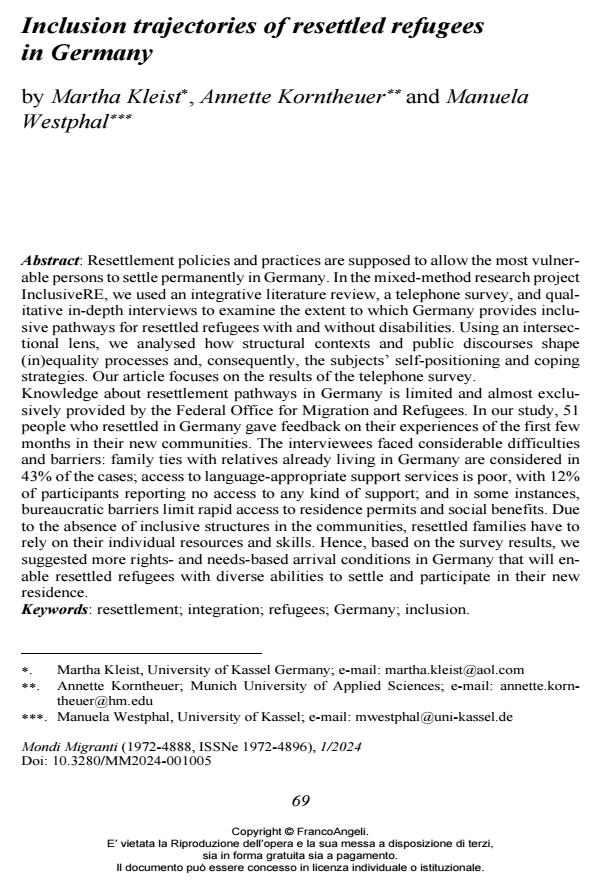Inclusion trajectories of resettled refugees in Germany
Journal title MONDI MIGRANTI
Author/s Martha Kleist, Annette Korntheuer, Manuela Westphal
Publishing Year 2024 Issue 2024/1
Language English Pages 16 P. 69-84 File size 200 KB
DOI 10.3280/MM2024-001005
DOI is like a bar code for intellectual property: to have more infomation
click here
Below, you can see the article first page
If you want to buy this article in PDF format, you can do it, following the instructions to buy download credits

FrancoAngeli is member of Publishers International Linking Association, Inc (PILA), a not-for-profit association which run the CrossRef service enabling links to and from online scholarly content.
Resettlement policies and practices are supposed to allow the most vulnerable per-sons to settle permanently in Germany. In the mixed-method research project In-clusiveRE, we used an integrative literature review, a telephone survey, and quali-tative in-depth interviews to examine the extent to which Germany provides inclu-sive pathways for resettled refugees with and without disabilities. Using an intersec-tional lens, we analysed how structural contexts and public discourses shape (in)equality processes and, consequently, the subjects’ self-positioning and coping strategies. Our article focuses on the results of the telephone survey. Knowledge about resettlement pathways in Germany is limited and almost exclu-sively provided by the Federal Office for Migration and Refugees. In our study, 51 people who resettled in Germany gave feedback on their experiences of the first few months in their new communities. The interviewees faced considerable diffi-culties and barriers: family ties with relatives already living in Germany are consid-ered in 43% of the cases; access to language-appropriate support services is poor, with 12% of participants reporting no access to any kind of support; and in some instances, bureaucratic barriers limit rapid access to residence permits and social benefits. Due to the absence of inclusive structures in the communities, resettled families have to rely on their individual resources and skills. Hence, based on the survey results, we suggested more rights- and needs-based arrival conditions in Germany that will enable resettled refugees with diverse abilities to settle and par-ticipate in their new residence.
Keywords: resettlement; integration; refugees; Germany; inclusion.
Martha Kleist, Annette Korntheuer, Manuela Westphal, Inclusion trajectories of resettled refugees in Germany in "MONDI MIGRANTI" 1/2024, pp 69-84, DOI: 10.3280/MM2024-001005